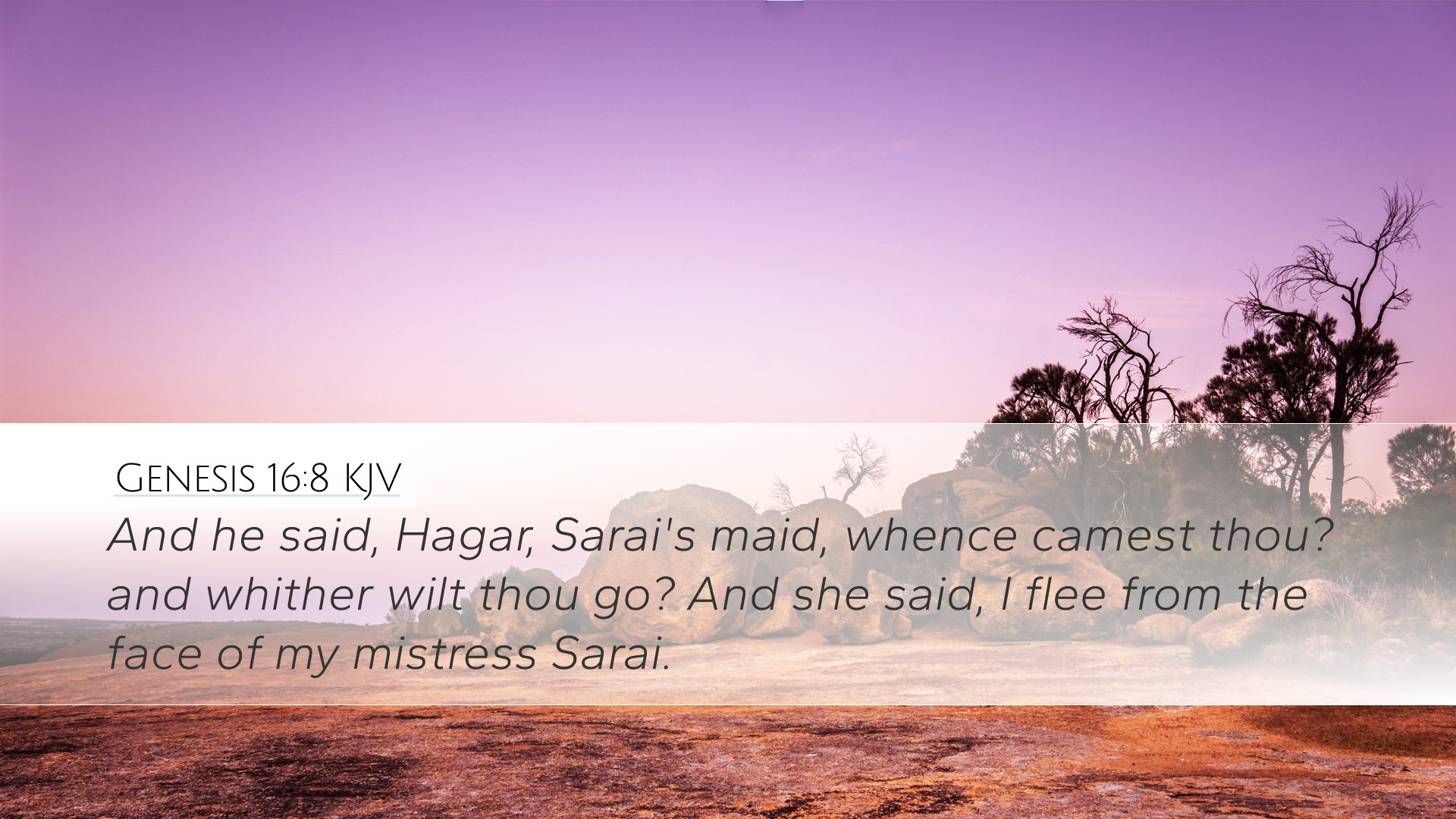Commentary on Genesis 16:8
Verse Reference: Genesis 16:8 - "And he said, Hagar, Sarai's maid, whence camest thou? and whither wilt thou go? And she said, I flee from the face of my mistress Sarai."
Introduction
The passage of Genesis 16:8 is pivotal in the narrative of Hagar, Abram, and Sarai. It reveals significant themes of struggle, identity, and divine intervention. This commentary draws insights from respected public domain sources to unpack the verse's rich meaning.
Contextual Background
In the broader narrative of Genesis, this event occurs when Sarai, barren and desiring to fulfill God's promises to Abram, offers her maid Hagar to Abram as a means to bear children. This act reflects the social customs of the time but also introduces conflict and moral complexity.
Historical Context
- During this period, it was customary for women who were unable to conceive to use their maidservants to bear children.
- This practice was viewed as a way to ensure lineage and legacy within the family structure, as understood in the ancient Near Eastern culture.
Verse Analysis
God's Inquiry and Hagar's Situation
The verse begins with God's inquiry directed at Hagar: "Whence camest thou? and whither wilt thou go?" This question serves multiple purposes:
- Awareness of Situation: God demonstrates awareness of Hagar's plight, indicating His concern for her condition as a marginalized individual.
- Encouraging Reflection: The questions compel Hagar to reflect on her circumstances, prompting a moment of introspection.
- Establishing Dialogue: The inquiry establishes a personal relationship between God and Hagar, setting the stage for divine revelation and guidance.
Hagar's Response
Hagar's response, "I flee from the face of my mistress Sarai," encapsulates her desperation and illustrates the broader themes of oppression and alienation. Several points emerge from her declaration:
- Position of Subjugation: Hagar identifies herself in relation to Sarai, emphasizing her role as a servant and her lack of agency within the household.
- The Flight Motif: The act of fleeing symbolizes her physical and emotional escape from a hostile environment where she experiences mistreatment.
- Recognition of Conflict: Hagar's flight highlights the discord within the household of Abram, underscoring the consequences of human actions that deviate from divine intent.
Theological Implications
God’s Compassion
This passage showcases God's compassion towards the oppressed, as Hagar is a representation of those marginalized in society. Commentators like Matthew Henry emphasize that God is attentive to the plight of the downtrodden, revealing a profound theological truth: God sees and cares for all people, regardless of their social status.
The Lord’s Knowledge and Guidance
God's inquiry reflects His omniscience; He knows where Hagar has come from and the challenges she faces. Adam Clarke notes that this divine knowledge is coupled with a readiness to guide and direct, suggesting that God provides a pathway for those in distress.
Restoration and Hope
Hagar, in her state of flight, is offered restoration through divine encounter. This moment foreshadows the coming redemption and hope that God promises not only to her but to the entire lineage that emerges from this narrative. Albert Barnes emphasizes that even in the midst of turmoil, God’s plan for restoration and blessings unfolds, demonstrating His unwavering faithfulness to His covenant promises.
Practical Reflections
For Pastoral Ministry
Pastors can draw from this text the importance of recognizing the struggles of those who may feel marginalized in society. Just as God engaged with Hagar, church leaders are called to provide pastoral care and empathy for the disenfranchised.
For Theological Studies
This verse invites deeper exploration into themes of providence, human agency, and divine interaction. The interplay between Hagar's agency and God's initiative provides rich material for theological dialogue, particularly regarding the nature of God’s providential care in the complexities of human relationships.
For Personal Reflection
This passage prompts believers to reflect on their own responses to feeling alienated or oppressed. Hagar’s story serves as an encouraging reminder that God sees and hears the cries of those in distress, inviting them into a transformative relationship.
Conclusion
Genesis 16:8 encapsulates a profound moment in the biblical narrative, inviting readers to grapple with complex social dynamics and divine faithfulness. The insights gleaned from esteemed commentators emphasize that in times of fear and uncertainty, God's voice can guide us toward healing and hope. As we engage with this text, may we find encouragement in God’s attentive, compassionate nature toward all of humanity.


